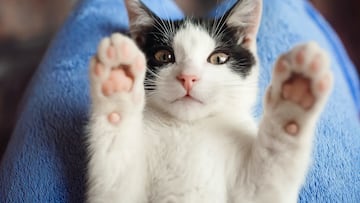If you think your cat is holding a grudge, this is the maximum time he will be angry with you according to experts
Do cats hold grudges with their owners? Experts emphasize the importance of respecting a cat’s time and space.

Cats have been enigmatic companions to humans for centuries. Their independence, combined with their ability to show affection, has created a unique bond that often leads to misunderstandings. Among the many questions surrounding their behavior, one stands out: Can cats hold grudges against their owners?
While it’s easy to attribute human emotions to these animals, feline behavior experts point out that the reality is more complex. Although cats may react negatively to certain interactions or experiences, these responses are not due to feelings of resentment but rather natural strategies to avoid stress.
😾: don't do that! pic.twitter.com/apc6L7LWi1
— Posts Of Cats (@PostsOfCats) January 26, 2025
Cats' self-preservation to avoid being stressed
Daniel Warren Cummings, a renowned clinical animal behaviorist and feline behavior specialist, dismisses the idea that cats experience complex human emotions like grudges. According to him, what many interpret as resentment is actually an instinctive response to avoid unpleasant situations.
For example, if a cat is hugged or held excessively, it may start to avoid the person responsible for these interactions. However, this behavior does not imply conscious rejection but rather an association between the person and an experience the cat finds negative.
“The behavior we interpret as a grudge is actually a survival mechanism designed to minimize stress,” explains Cummings.
— Posts Of Cats (@PostsOfCats) January 28, 2025
Signs of feline discomfort
To understand if a cat is experiencing stress after an uncomfortable encounter, the British organization Cats Protection recommends looking for certain signs. These include:
- A tendency to hide more than usual.
- Reduced tolerance for human contact.
- A hunched body posture with ears flattened to the sides.
- Constant tail movement, indicating irritation or nervousness.
Understanding these signs can help cat owners better respect their pets' boundaries and create a more comfortable environment for them. Have you noticed any of these behaviors in your cat?
These reactions are temporary and, according to experts, usually subside if the cat is provided with a calm and respectful environment. Forcing interaction or trying to speed up their recovery can worsen the issue.
Cat enjoying the sun.. 😊 pic.twitter.com/pqChCp29IR
— Buitengebieden (@buitengebieden) January 7, 2025
Why cats need respect and patience
The time a cat may remain “upset” depends on its personality and the severity of the situation. While some cats recover quickly, others may need days to regain trust. “The most important thing is to respect the animal’s time and space,” Cummings emphasizes.
Creating a stress-free environment, avoiding forced interactions, and allowing the cat to approach on its own terms are essential strategies for rebuilding the relationship. Ultimately, the cat’s emotional well-being depends on a balance between respecting its individual needs and providing a safe and welcoming environment.
Related stories
So, if your cat seems upset with you, don’t take it personally. It’s not holding a grudge; it just needs a moment to regain its composure.
Complete your personal details to comment